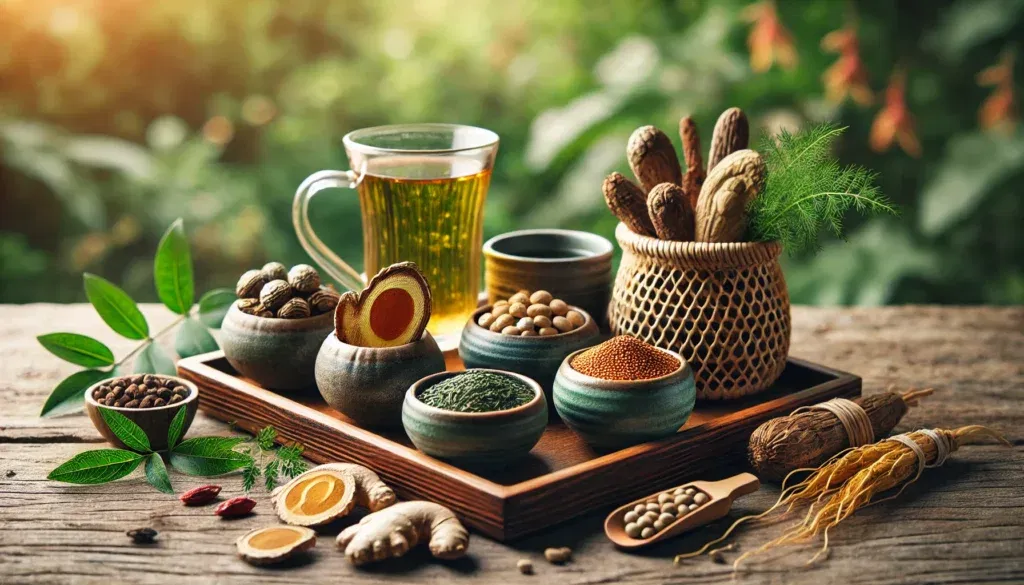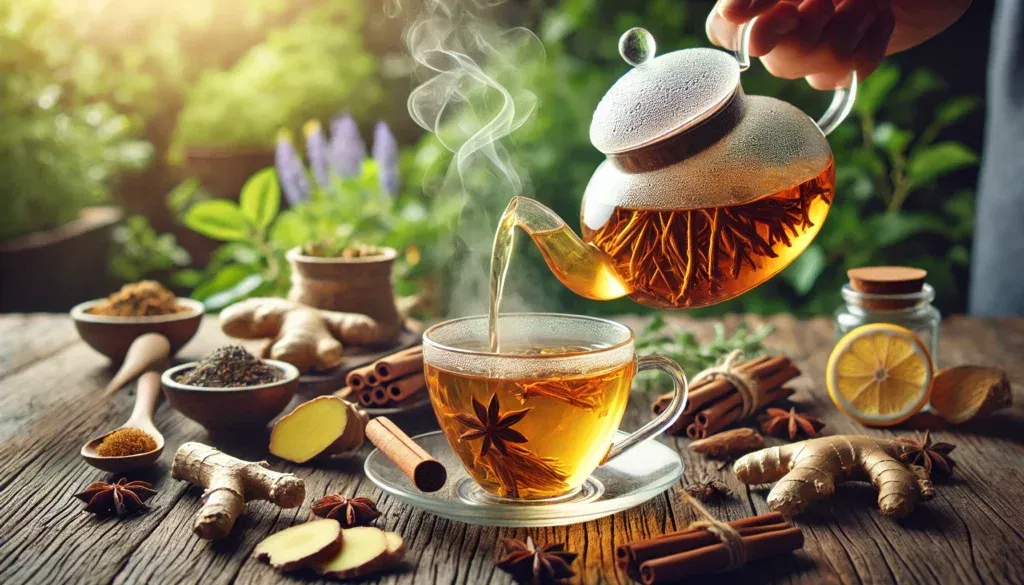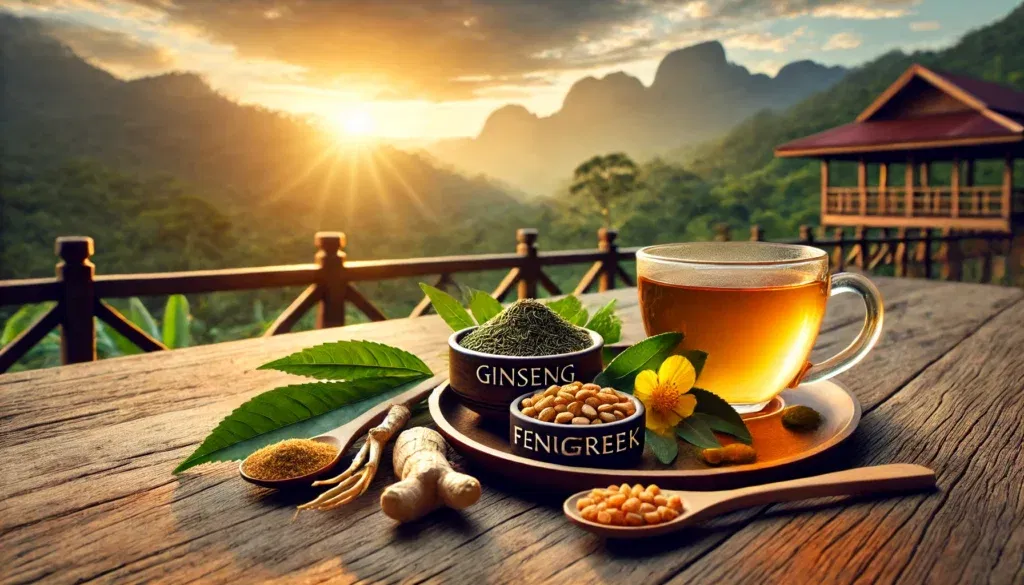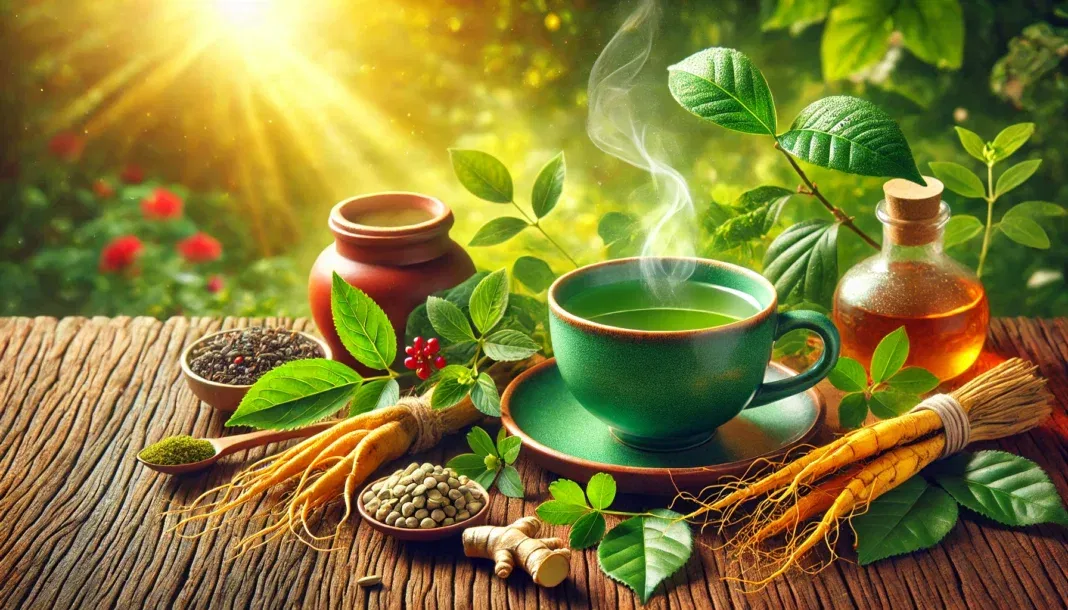The growing interest in natural health solutions has led to an increased focus on tea as a potential aid for hormonal balance, particularly in relation to testosterone levels. Testosterone, a crucial hormone in male health, affects everything from muscle mass and bone density to mood and energy levels. As men seek natural ways to maintain optimal hormone levels, many are turning to tea testosterone benefits, hoping that herbal infusions can offer support. But does green tea boost testosterone, and can specific herbal blends serve as effective testosterone relief tea?
You may also like: How to Increase Testosterone Levels Naturally: Science-Backed Strategies for Men’s Health & Longevity
The relationship between tea and hormone health is complex. While some teas may positively influence testosterone levels, others could have the opposite effect. Understanding the mechanisms at play, as well as the specific types of testosterone booster tea available, is essential for those looking to incorporate herbal teas into their wellness routine.

Understanding Testosterone and Its Role in Men’s Health
Testosterone is the primary male sex hormone, though it is also present in women in smaller amounts. It plays a vital role in multiple physiological functions, including reproductive health, muscle development, fat distribution, bone strength, and even mental well-being. Testosterone levels naturally decline with age, typically decreasing by about 1% per year after the age of 30. While this decline is normal, certain lifestyle factors—such as poor diet, stress, and lack of exercise—can accelerate the process.
Low testosterone levels can lead to a range of symptoms, including fatigue, reduced libido, mood swings, and decreased muscle mass. In severe cases, it may contribute to conditions such as osteoporosis or metabolic disorders. Given the importance of maintaining healthy testosterone levels, many men seek natural approaches, including dietary modifications and supplementation, to support their hormonal health. This has led to the growing interest in tea testosterone benefits, as certain herbal blends contain compounds that may influence hormonal balance.
The Science Behind Tea and Hormonal Balance
Tea is rich in bioactive compounds, including polyphenols, catechins, flavonoids, and alkaloids, all of which can influence hormone levels in different ways. Some of these compounds act as antioxidants, helping to reduce oxidative stress, which can negatively impact testosterone production. Others may interact directly with hormonal pathways by influencing enzyme activity or receptor function.
For example, green tea contains epigallocatechin gallate (EGCG), a powerful antioxidant that has been shown to impact testosterone metabolism. However, the effects of EGCG on testosterone are not entirely straightforward—some studies suggest that it may have anti-androgenic properties, potentially lowering testosterone in high doses. On the other hand, other herbal teas contain adaptogenic compounds that support the body’s stress response, which can indirectly contribute to improved testosterone levels by reducing cortisol, a stress hormone known to suppress testosterone production.
Does Green Tea Boost Testosterone? The Mixed Evidence
Green tea is often praised for its numerous health benefits, including its role in supporting cardiovascular health, metabolism, and cognitive function. However, when it comes to testosterone, the research presents a more nuanced picture. Some studies suggest that the catechins in green tea, particularly EGCG, may help protect Leydig cells in the testes, which are responsible for testosterone production. By reducing oxidative damage to these cells, green tea could theoretically support healthy testosterone levels.
Conversely, other studies indicate that excessive consumption of green tea may inhibit the enzyme 5-alpha reductase, which converts testosterone into its more potent form, dihydrotestosterone (DHT). While reducing DHT levels might be beneficial for conditions such as male pattern baldness or prostate enlargement, it could also result in lower overall androgenic activity. Therefore, moderation is key—incorporating green tea into the diet in reasonable amounts may offer antioxidant protection without significantly disrupting testosterone balance.
Testosterone Booster Tea: Herbal Infusions That Support Hormone Health
Beyond green tea, several herbal teas have been studied for their potential to support testosterone production. Adaptogenic herbs, in particular, are known for their ability to modulate stress responses, which can be beneficial for maintaining hormonal equilibrium. Some of the most promising herbal teas for testosterone support include:
1. Ashwagandha Tea
Ashwagandha is a powerful adaptogen that has been traditionally used in Ayurvedic medicine to enhance vitality and strength. Research indicates that ashwagandha supplementation can lead to significant increases in testosterone levels, likely due to its ability to lower cortisol. Cortisol, the body’s primary stress hormone, can suppress testosterone production when chronically elevated. Drinking ashwagandha tea may provide a natural way to support hormonal balance and overall well-being.
2. Ginger Tea
Ginger is another potent natural remedy with potential testosterone-boosting effects. Studies suggest that ginger can enhance testosterone production by improving blood circulation, reducing oxidative stress, and increasing luteinizing hormone (LH), which signals the testes to produce more testosterone. Additionally, ginger has anti-inflammatory properties that may help protect Leydig cells from damage, further supporting hormonal health.
3. Fenugreek Tea
Fenugreek is widely recognized for its testosterone-enhancing properties. It contains compounds known as furostanolic saponins, which have been shown to support free testosterone levels by inhibiting the conversion of testosterone into estrogen. Drinking fenugreek tea may help maintain hormonal balance, particularly in men experiencing age-related testosterone decline.
4. Tribulus Terrestris Tea
Tribulus Terrestris is a traditional herbal remedy often associated with improved libido and testosterone levels. Some studies suggest that it may increase the production of LH, thereby stimulating testosterone synthesis. While the evidence is mixed, Tribulus Terrestris tea remains a popular choice among those seeking natural testosterone support.
5. Rooibos Tea
Rooibos tea is rich in antioxidants and has been studied for its effects on hormone balance. Some research suggests that rooibos may inhibit aromatase, an enzyme that converts testosterone into estrogen. By reducing aromatase activity, rooibos tea could help maintain higher testosterone levels, particularly in aging men.
Practical Tips for Incorporating Testosterone Booster Tea into Your Routine
To maximize the benefits of testosterone booster tea, it’s important to incorporate these herbal infusions strategically into a balanced lifestyle. Drinking tea as part of a healthy diet that includes adequate protein, healthy fats, and micronutrients such as zinc and magnesium can further support testosterone production. Regular exercise, particularly resistance training and high-intensity interval training (HIIT), can also amplify the benefits of herbal teas on hormone balance.
It is equally important to be mindful of caffeine intake. While moderate caffeine consumption can enhance alertness and metabolic function, excessive caffeine can increase cortisol levels, potentially counteracting the testosterone-boosting effects of herbal teas. Opting for caffeine-free options such as rooibos or ashwagandha tea in the evening can help maintain hormonal balance while promoting relaxation and recovery.

Frequently Asked Questions (FAQ) About Tea and Testosterone
1. How does tea affect testosterone levels?
Tea can influence testosterone levels in various ways depending on the type of tea consumed. Some teas, like green tea, contain catechins, which have been studied for their ability to reduce oxidative stress and inflammation, indirectly benefiting hormonal balance. However, green tea also contains epigallocatechin gallate (EGCG), which may lower testosterone by inhibiting certain enzymes involved in hormone production. On the other hand, herbal infusions like ashwagandha or fenugreek-based testosterone booster tea can help support healthy testosterone levels by reducing cortisol and enhancing androgen receptor sensitivity. Understanding the nuanced effects of different teas can help individuals tailor their consumption to their specific health goals.
2. Does green tea boost testosterone, or does it lower it?
The relationship between green tea and testosterone is complex. Green tea contains powerful antioxidants that help protect testicular cells from oxidative stress, which can support hormonal health. However, some studies suggest that high doses of EGCG in green tea can inhibit testosterone production by affecting the 5-alpha reductase enzyme. Moderation is key—consuming green tea in reasonable amounts may offer overall health benefits without significantly reducing testosterone levels. If you are concerned about testosterone decline, pairing green tea with other testosterone-friendly lifestyle habits, such as strength training and a protein-rich diet, may mitigate any negative effects.
3. What are the best ingredients in testosterone booster tea?
Several natural ingredients can be added to testosterone booster tea to enhance its effectiveness. Herbs like ashwagandha, fenugreek, and ginseng have been extensively studied for their role in increasing testosterone and improving male health. Ginger tea has also been shown to enhance testosterone production by reducing inflammation and boosting luteinizing hormone levels. Additionally, tribulus terrestris is commonly used in herbal teas to support testosterone levels, though its effectiveness varies among individuals. Combining these ingredients in a daily tea routine may provide a natural boost to testosterone levels without relying on synthetic supplements.
4. Can tea testosterone benefits be maximized by pairing it with specific foods?
Yes, pairing testosterone relief tea with certain nutrient-rich foods can enhance its effectiveness. Foods high in zinc, such as oysters, pumpkin seeds, and beef, help support testosterone synthesis. Healthy fats from avocados, nuts, and olive oil can also promote hormone production. Additionally, vitamin D-rich foods like eggs and fatty fish work synergistically with herbal teas to optimize testosterone levels. Avoiding excessive sugar and processed foods while consuming testosterone-friendly teas ensures a more balanced hormonal profile. Strategic dietary choices can amplify the benefits of tea for testosterone regulation.
5. Are there any teas that naturally block testosterone?
Yes, certain teas contain compounds that may reduce testosterone levels. Spearmint and peppermint tea, for instance, have been shown to lower free testosterone levels, particularly in women with conditions like polycystic ovary syndrome (PCOS). These teas contain anti-androgenic properties that could be counterproductive for men aiming to maintain or increase testosterone. Additionally, excessive consumption of soy-based teas, which contain phytoestrogens, may also interfere with testosterone production. Understanding the hormonal impact of different teas can help individuals make informed choices based on their health objectives.
6. How does tea testosterone support compare to other natural remedies?
Tea is one of many natural remedies for testosterone support, and its effectiveness depends on the ingredients used. Compared to direct testosterone-boosting supplements, tea provides a gentler, holistic approach by incorporating antioxidants, minerals, and adaptogenic herbs. Lifestyle factors like resistance training, adequate sleep, and stress management play crucial roles in maintaining healthy testosterone levels. While testosterone booster tea can be a beneficial addition, it should be part of a broader wellness strategy rather than a standalone solution. Combining multiple natural interventions ensures a well-rounded approach to hormonal health.
7. Can women benefit from testosterone relief tea?
Yes, women can benefit from testosterone relief tea, but the impact depends on individual hormonal needs. Low testosterone in women can lead to fatigue, decreased libido, and muscle loss, making certain herbal teas beneficial. Ingredients like ashwagandha and maca root, often found in testosterone booster tea, help balance hormones without causing excessive androgenic effects. However, women with conditions like PCOS should be cautious, as some testosterone-boosting herbs might exacerbate symptoms related to high androgen levels. Consulting a healthcare provider before incorporating herbal teas into a hormone-balancing regimen is always advisable.
8. How often should I drink testosterone booster tea for noticeable effects?
The frequency of consuming testosterone booster tea depends on the potency of the ingredients and individual hormonal needs. Drinking one to two cups per day is generally safe and may yield positive effects over several weeks. Consistency is key—herbal remedies often take time to show results, as they work by gradually supporting endocrine function. It’s also essential to track symptoms and adjust intake accordingly. If any adverse effects occur, such as increased irritability or hormonal imbalance, reducing the frequency or switching to a milder blend may be necessary.
9. Can drinking tea alone significantly raise testosterone levels?
While tea can contribute to testosterone regulation, drinking tea alone is unlikely to cause a dramatic increase in testosterone levels. The best results come from a comprehensive lifestyle approach, including proper nutrition, exercise, sleep, and stress management. Herbal teas can complement these efforts by providing adaptogens and antioxidants that support endocrine health. Relying solely on tea without addressing other lifestyle factors will limit its effectiveness. Those seeking significant testosterone improvements should consider integrating multiple health strategies alongside tea consumption.
10. What is the best time of day to drink testosterone booster tea?
The best time to drink testosterone booster tea depends on its ingredients and personal lifestyle preferences. Morning consumption may be ideal for teas containing energy-boosting herbs like ginseng, which can enhance focus and stamina throughout the day. Evening tea, particularly with ingredients like ashwagandha, can promote relaxation and stress reduction, indirectly benefiting testosterone production. Pre-workout tea containing ginger or fenugreek may also support performance and recovery. Adjusting the timing based on daily activities and personal responses can maximize the benefits of tea for testosterone regulation.

Conclusion: Can Tea Be a Natural Ally for Testosterone Support?
While tea alone may not be a miracle solution for low testosterone, incorporating the right herbal infusions into a healthy lifestyle can contribute to overall hormonal well-being. The key is to select teas that provide antioxidant protection, support stress resilience, and enhance metabolic health, all of which can create a more favorable environment for optimal testosterone levels. Whether through green tea in moderation, adaptogenic herbs like ashwagandha and ginger, or testosterone-supportive teas such as fenugreek and Tribulus Terrestris, men looking for natural ways to maintain hormonal health can benefit from a well-rounded approach that includes strategic tea consumption. As with any health intervention, consulting a healthcare professional before making significant dietary changes is always recommended.
herbal testosterone support, adaptogenic teas for men, hormone balance herbal infusions, best teas for testosterone health, natural ways to boost testosterone, testosterone-friendly beverages, green tea and hormone health, boosting testosterone naturally, herbal remedies for low testosterone, men’s health and herbal teas, testosterone and metabolism, ashwagandha for testosterone, fenugreek tea benefits, rooibos and hormonal balance, stress reduction and testosterone, natural testosterone boosters, best herbal teas for men, how tea affects testosterone, adaptogens and hormone support, tribulus terrestris tea benefits
Further Reading:
Herbs, Vitamins, and Supplements for Testosterone
Examining the Effects of Herbs on Testosterone Concentrations in Men: A Systematic Review
Disclaimer: The information provided in this article is for general informational purposes only. The content does not constitute professional advice of any kind, including but not limited to medical, legal, or financial advice. HisHealthMag and its contributors make no representations or warranties regarding the accuracy, completeness, or reliability of the information presented. Always seek the advice of a qualified professional for any specific concerns or questions you may have. Neither HisHealthMag nor its authors assume any responsibility or liability for any actions taken based on the information provided in this article. The views and opinions expressed are those of the author(s) and do not necessarily reflect the official policy or position of HisHealthMag.





